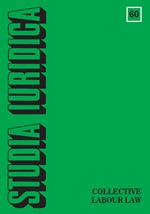Workers’ Representation in European Law
Workers’ Representation in European Law
Author(s): Monika TomaszewskaSubject(s): Law, Constitution, Jurisprudence
Published by: Wydawnictwa Uniwersytetu Warszawskiego
Keywords: workers’ representation; the European law; the Treaty of Maastricht; the European Community; Member States; the Charter of Fundamental Rights of the European Union; the Lisbon Treaty; the European Union; European Works Councils
Summary/Abstract: The author presents an analysis of the workers’ representation in the European law. Firstly, the legal basis of workers’ representation in the European law until the adoption of the Treaty of Maastricht and after adoption of that Treaty is described. Until the changes made by the Treaty of Maastricht, the employees’ right to information and consultation remained in the sole competences of Member States. The competence of the European Community in that field was recognized in the Maastricht Protocol on Social Policy. In 1989 the Community Charter of the Fundamental Social Rights of Workers has been adopted, thanks to which the rights of workers and their representatives to information and consultation grew in importance, becoming one of the objectives of the European Community and its Member States. Next, there were adopted directives concerning the establishment of European works councils and providing a basis for the setting of framework conditions of employee information and consultation. At the summit of Nice in 2000, the Charter of Fundamental Rights of the European Union was adopted. Since the conclusion of the Lisbon Treaty it has become a part of the EU law, with binding force being equal to the force of the Treaties themselves. After the analysis of the legal basis, the author comments the notion of workers’ representation in the law of the European Union. In that field, the European Union has in competences that are shared with or exercised parallel to Member States, exercised according to the criterion of proportionality and the principle of subsidiarity. The last issue considered by the author are the forms of workers’ participation in the law of the European Union. The most developed forms of participation have been provided for in the directive on the establishment of the European Works Councils and the directive on informing and consulting employees.
Journal: Studia Iuridica
- Issue Year: 2015
- Issue No: 60
- Page Range: 255-267
- Page Count: 13

